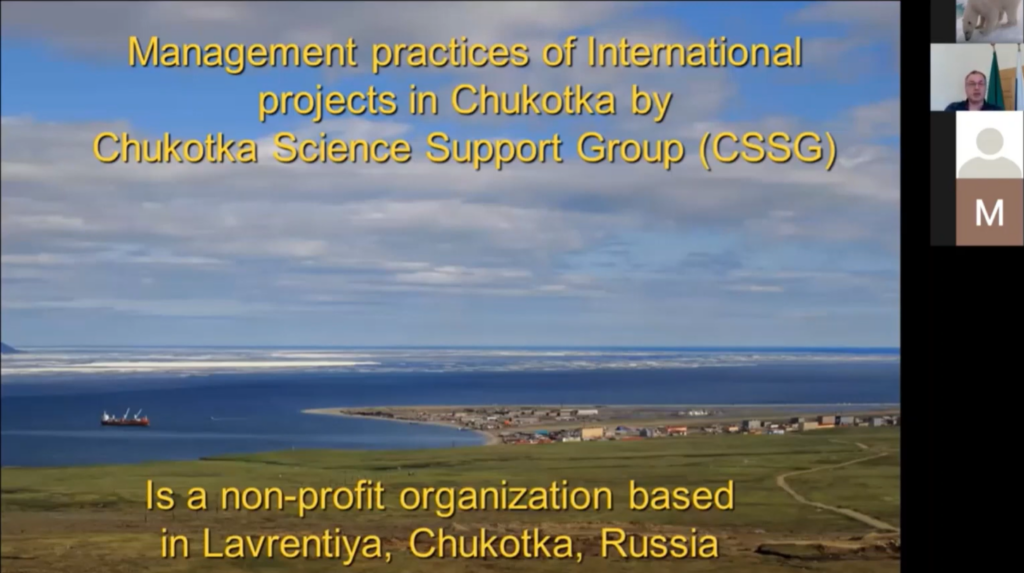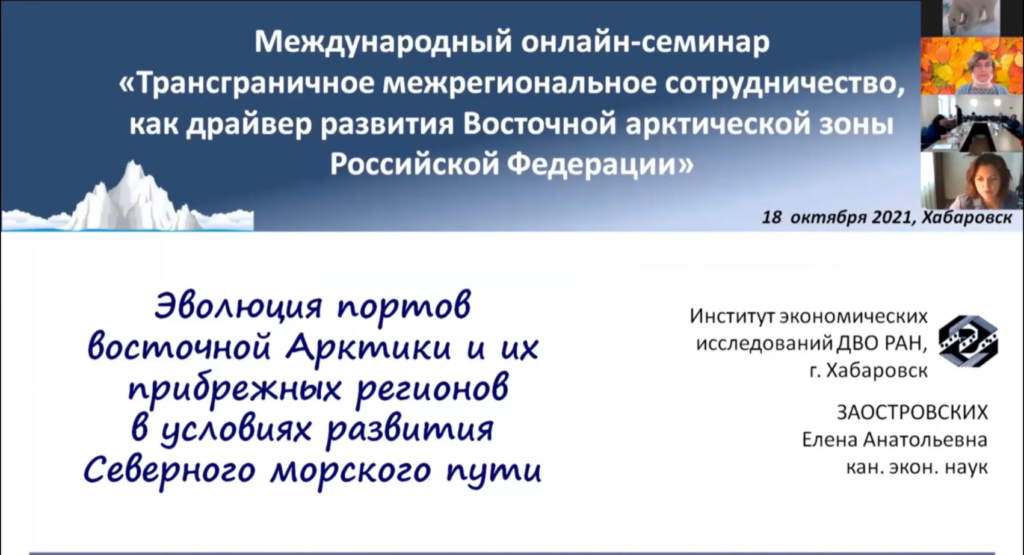On October 18, 2021 the online seminar “Cross-border interregional cooperation in the Asia-Pacific Region as a driver for the development of the Russian Far East and the Asian Arctic” was organized as a cooperative effort involving Khabarovsk State University of Economics and Law, Hokkaido University Arctic Research Center, Human Resource Development Platform for Japan-Russia Economic Cooperation and Personnel Exchange (HaRP, in particular, the specialized section “SDGs: Environment, Resource Development and Multicultural Education”), the Arctic Challenge for Sustainability (ArCS) II – project (especially research program “Elucidating the Complex Dynamics of Arctic Politics and Its Contribution to Japan’s Arctic Policy” and its subgroup 4 “Non-state actors and paradiplomacy”), and the UArctic Thematic Network on the Arctic in Asia, Asia in the Arctic.
This event was held for examining the existing and prospective patterns of cooperation between regional actors including universities and research institutions, local governments, indigenous communities, and private actors who provide support to their projects, in the light of the current Russian, Chinese and Japanese legislative framework and Arctic policies and major state-supported Arctic projects of the three states. Its main objective was to elucidate the most promising areas and forms of future cooperation that would contribute to the development of the Russian Far East, particularly its northern part.
The seminar with simultaneous interpretation into English and Russian was attended by over 80 participants from Russia, Japan, and China. It continued a seminar series (Multilevel Governance and Interregional Cooperation) organized as part of the ArCS II project and HaRP:
- Seminar 1 – Online workshop “Multilevel Governance and Interregional Cooperation: Vol.1 – The Pacific Arctic” held on January 12, 2021
- Seminar 2 – Online workshop “Japan-Russia Interregional Cooperation in the Arctic and North – Theory and Practice” held on March 3, 2021
- Seminar 3 – Online workshop “Multilevel Governance and Interregional Cooperation: Vol.2 – The Barents Region” held on June 9, 2021”
- Seminar 4 – Online workshop “Sustainable Regional Development, International Cooperation and the Protection of the Arctic Environment” held on September 14, 2021
It drew on the results of cooperation and network of contacts established through the Cold Lands seminars / Northern Sustainable Development Forums in 2019–2020.
The seminar consisted of two parts and welcoming words from Anna Zhebo, Vice-Rector of Khabarovsk State University of Economics and Law.
Part 1 included presentations from Russian, Japanese and Chinese scholars and representatives of NGOs (Juha Saunavaara and Marina Lomaeva, Hokkaido University; Gao Tianming, Harbin Engineering University; Mikhail Ershov, the Association of National Sports and Games of the Peoples of Yakutia; Gennady Zelensky, the Chukotka Scientific Research Support Group.
Part 2 included four presentations delivered by scholars representing Russian and Chinese universities and regional governments (Elena Zaostrovskikh, the Institute of Economic Research, Far Eastern Branch of the Russian Academy of Sciences (Khabarovsk); Guo Peiqing, Ocean University of China; Alexander Voronenko, the Legislative Duma of the Khabarovsk Territory; Yin Zhao, East University Of Heilongjiang (PRC). Unfortunately, the speech by Paul Fuhs (the Arctic Economic Council, the NGO Marine Exchange of Alaska (MXAK)) had to be cancelled at the last minute.
Part 1 shed light on both the possibilities and challenges of international and interregional academic cooperation. Furthermore, in addition to introducing the local peculiarities that need to be taken into consideration when carrying out field work in Chukotka, for instance, the speakers also analyzed the promotion of the traditional culture as an activity that can help to build bridges between the northern people over the national borders. Part 2 continued from here and analyzed infrastructural development and cross-border economic cooperation, especially in relation to the Northern Sea Route. Furthermore, attention was also paid to the legal framework for business activities in the Arctic zone of the Russian Federation.
This seminar brought together speakers and participants representing various universities, research institutes, NGOs, different levels of government and the associated agencies, and private companies. We hope that it contributed at least to three kinds of discussions: 1) discussion concerning the role of academic, cultural and economic cooperation in the development of the Arctic and northern Asia-Pacific region; 2) discussion concerning the region-building processes in the Russian Far East and the Asian Arctic; and 3) discussion concerning the role of non-state actors in cross-border cooperation.
Video (YouTube)
Program
Click here to see the full program.
Presentation materials
Related Information
The list of organizations whose representatives participated.
Russian universities
- Far Eastern Federal University
- Far Eastern State Transport University (FESTU)
- Khabarovsk State University of Economics and Law
- North-Eastern Federal University in Yakutsk
- North-Eastern Federal University in Yakutsk, Scientific-Research Institute of Regional Economy of the North
- Northern (Arctic) Federal University
- Pacific National University
- Petrozavodsk State University
- Russian State Hydrometeorological University
- Saint Petersburg State University
- Saint-Petersburg University of Management Technologies and Economics
- Saratov State University
- Udmurt State University
- Ural State Pedagogical University
- Volgograd State University
Other Russian organizations
- Advanced Georadar Technologies
- Association of Kamchatka Tourism
- Chukotka Science Support Group
- Economic Research Institute of the Far Eastern Branch of the Russian Academy of Sciences
- Ethno-Cultural Association “Elleyada”
- Far-Eastern Chamber of Commerce& Industry, Union
- Kamchatka Branch of the Pacific Institute of Geography (Russian Academy of Sciences)
- St. Petersburg Scientific Fund
- Japanese universities and other organizations
- Hokkaido University
- Economic Research Institute for Northeast Asia (ERINA)
- Consulate General of Japan in Khabarovsk
Chinese universities
- East University of Heilongjiang (China)
- Harbin Engineering University (China)
- Ocean University of China








